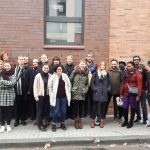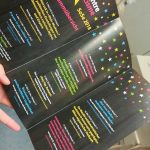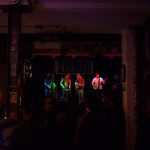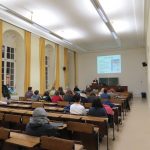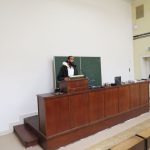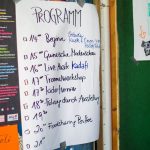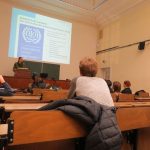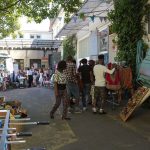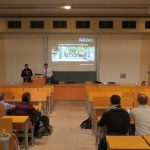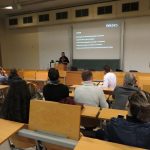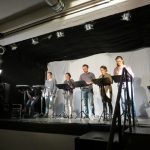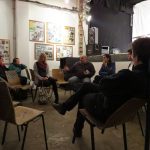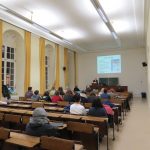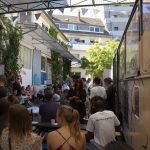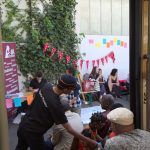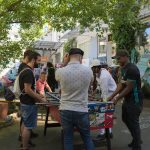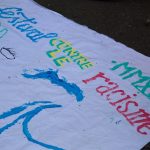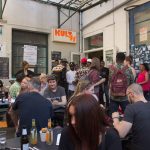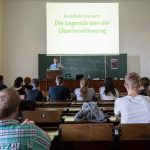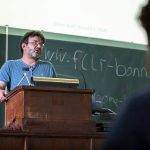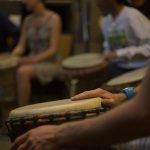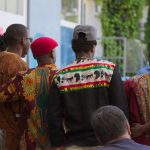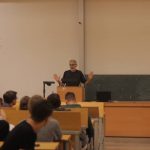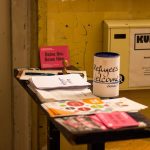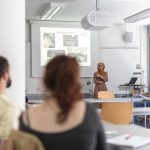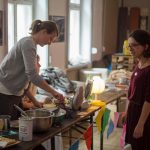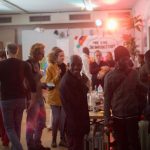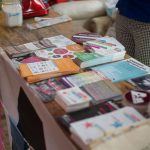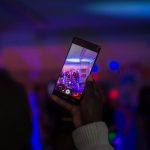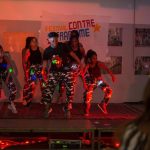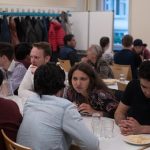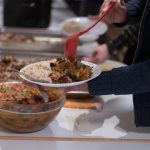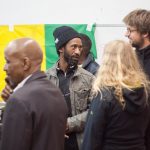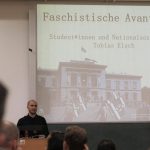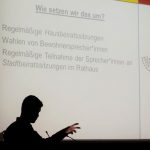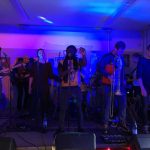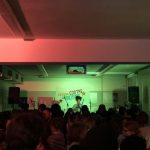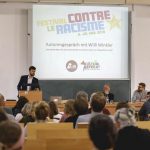Freitag, 1. Juli, 16:00 Uhr, Hörsaal XVII
Die Kunst- und Kulturbranche schreibt sich seit jeher auf die Fahne und ins Selbstverständnis, stets die Speerspitze der Gesellschaftsutopie zu repräsentieren und durch die Öffnung von Räumen, Impulse in der Verhandlung eines Miteinanders auf Augenhöhe zu setzen. Kaum eine Branche ist so sehr von Diskussionen über sich selbst und ihr Verhältnis zu Gesellschaft geprägt und abhängig. Gleichzeitig ist kaum eine Branche in sich geschlossener und intransparenter in ihrer Struktur und ihren Verfahren. Die vergangenen Jahre, insbesondere die Pandemiejahre haben teils drastisch gezeigt, wie tiefgreifend und fest verwachsen die Missstände in den Strukturen der Theater, Museen, Opern, Produktionsfirmen und Agenturen der Branche sind. Zahlreiche öffentliche Skandale um Rassismus, wie am Düsseldorfer Schauspielhaus oder dem Berliner Staatsballett, sind keineswegs Einzelfälle, sondern stehen repräsentativ für die vielen unsichtbaren Erfahrungen, die Kunstschaffende of Colour machen. Wie kann das sein? Welche Folgen hat dieser Graben zwischen Selbstverständnis und künstlerischer Repräsentation auf der einen Seite, und diskriminierenden Strukturen, unsichtbaren Machthierarchien und Willkür auf der anderen Seite? Was bedeutet das für die Menschen, die unter, mit und in diesen Strukturen arbeiten, träumen, zweifeln, kämpfen, schaffen und leben? Wie, wo, was, wann, warum – Let’s talk about it!
Auf diesem Panel werden sich drei junge Kunst- und Kulturschaffende mit Fragen rund um die Aufarbeitung von und den täglichen Kampf gegen Rassismus beschäftigen und gemeinsam erkunden, wie Kunst- und Kulturräume endlich die Orte werden können, an denen Gesellschaft von und für alle gemacht wird. Alle drei sind auf unterschiedliche Art und Weise politisch und/oder ehrenamtlich in Organisationen aktiv, die gegen strukturellen Rassismus kämpfen und haben zu dem Thema sowohl gearbeitet als auch selber Erfahrungen gemacht.
Das Panel wird auf Deutsch und Englisch stattfinden. Anschließend wird es Raum zur Diskussion geben.
Sulti Omar (they/them) (KH Weissensee, freie*r Künstler*in)
Sulti ist ein*e 25-jährige*r Künstler*in, they sich gegen Rassismus und für das Klima einsetzt. Sulti hatte die Möglichkeit, Kunst außerhalb akademischer Strukturen kennenzulernen: Fotografie, abstrakte Malerei, Skizzenbücher und Leinwände wurden schon früh zum Ort, an dem they Emotionen in Farben verwandelte. Neben diversen Street Art Projekten, Installationen und Ausstellungen in Slemani, Bonn, Köln und Berlin, begann Sulti 2021 ein Studium im Rahmen der *foundationClass an der Kunsthochschule Weißensee Berlin.
Sarah Elisabeth Braun (- /sie) (Bi*PoC-Netzwerk)
Sarah ist eine afro-deutsche Künstlerin und Aktivistin. Sie ist Mitbegründerin des Bi*PoC-Netzwerks und war von 2018 bis Juli 2021 Regieassistentin am Theater Bonn. Seit dem Sommersemester 2022 studiert sie an der HfS Ernst Busch Berlin Theaterregie. Sarah ist in verschiedenen politischen und /oder kulturellen Strukturen aktiv, arbeitet dort zu den Themen Rassismus, Klassismus, Feminismus, Intersektionalität und stärkt migrantische und schwarze Perspektiven.
Marco Damghani (er/ihn) (Stabiler Rücken e.V.)
Marco begann ab 2013 zahlreiche Regiehospitanzen und fand letztlich sogar bezahlte Arbeit in Form von festen Regieassistenzen. Zeitgleich gründete er den ‚Digger Slams‘, Bramfelds größte Kulturveranstaltung und organisiert und moderiert diese.Dann studierte er Regie an der HfS Ernst Busch Berlin und dem National Institute of Dramatic Arts in Sydney und gründete Stabiler Rücken e.V. Er lebt heute als freiberuflicher Autor und Regisseur mit zwei Katzen in Berlin.
Organisiert vom Referat für Politische Bildung des AStA der Universität Bonn.
English Version
Panel „Art or Resistance? – Intersectional perspectives on racism in arts and culture“
Friday, July 1, 16:00, Lecture Hall XVII
The arts and culture industry has always taken pride in presenting itself as the avant-garde of a social utopia. Hardly any other industry is so shaped by and dependent on discussions about itself and its relationship to society. At the same time, hardly any industry is more self-absorbed and opaque in its structure and procedures. The past few years, especially the pandemic years, have shown deeply rooted deficits in the structures of the theatres, museums, operas, production companies and agencies of the industry. Numerous public scandals around racism, such as at the Düsseldorfer Schauspielhaus or the Berliner Staatsballett, are by no means isolated cases, but are representative of the many invisible experiences that artists of colour make. How can this be? What are the consequences of this evident gap between self-image and artistic representation on the one hand, and discriminatory structures, invisible power hierarchies and arbitrariness on the other? How, where, what, when, why – Let’s talk about it!
On this panel, three young arts and culture professionals will address issues around resolving and fighting everyday racism and explore together how artistic and cultural spaces can finally become the places where society is made by and for all. All three guests are politically and/or voluntarily active in organisations that fight against structural racism and have worked on the topic, as well as made their own experiences with it.
The panel will be held in German and English. Afterwards there will be time for discussion.
Sulti Omar (they/them) (free artist, KH Weissensee)
Sulti is a 25 y/o artist who does anti racism and climate activism. Sulti had the possibility to get to know art out of academic structures. Photography, abstract painting, sketchbooks and canvases early in life became the place to collect their emotions in colours and a language to visualise inner feelings.Next to several street art projects, installations and exhibitions in Slemani, Bonn, Cologne and Berlin, Sulti started studying as a part of *foundationClass in Kunsthochschule Weißensee Berlin in 2021.
Sarah Elisabeth Braun (- /she) (BI*PoC-Netzwerk)
Sarah is an Afro-German artist and activist. She is the co-founder of the BI*PoC network and was an assistant director at Theater Bonn from 2018 to July 2021. Since the summer term of 2022, she has been studying directing at the HfS Ernst Busch. Sarah is active in various political and/or cultural structures, where she works on racism, classism, feminism and intersectionality. She makes visible and strengthens migrant and Black perspectives.
Marco Damghani (he/him) (Stabiler Rücken e.V.)
From 2013 onwards, numerous internships in directing and ultimately even paid work in the form of permanent assistant directorships. At the same time, he founded and has since organised and moderated the ‚Digger Slam‘, Bramfeld’s largest cultural event. Afterwards he studied directing at the HfS Ernst Busch and the National Institute of Dramatic Arts in Sydney, as well as founding Stabiler Rücken e.V. Today he lives as a freelance writer and director with two cats in Leipzig.

